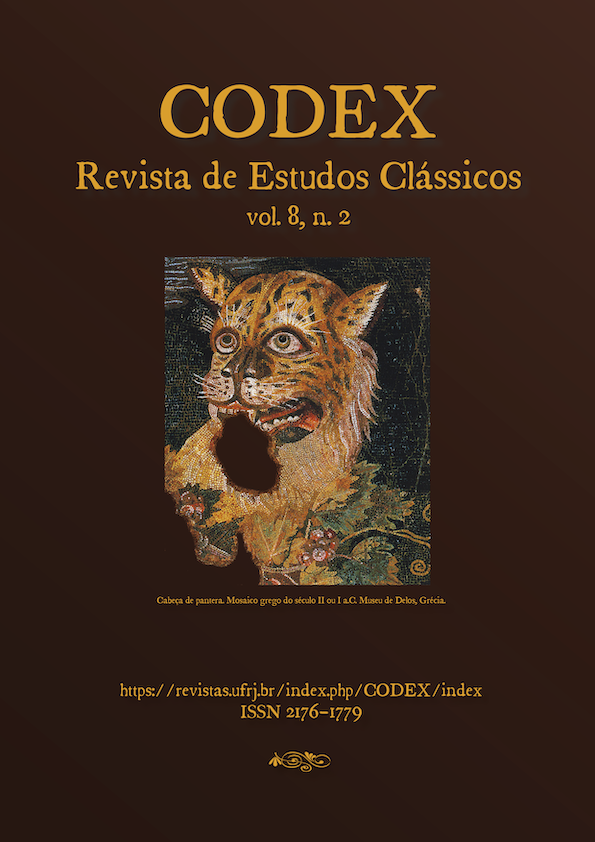Desire and laugh: the adorned woman in Aristophanes
DOI:
https://doi.org/10.25187/codex.v8i2.38322Keywords:
Aristophanes, women, comedy, seductionAbstract
Female adornment is an important element in the scenes of seduction, which is present in many genres of the Greek poetic tradition since the Archaic period. This paper considers some of these scenes in Homer and Hesiod and, in this light, aims at analyzing how Aristophanes works with this prototypical scene element in Lysistrata, Assembly of Women and Thesmophoriazusae II (frags. 332, 334 and 337).
References
ARISTÓFANES. Duas comédias: Lisístrata e Tesmoforiantes. Tradução, apresentação e notas de Adriane Duarte. São Paulo: Martins Fontes, 2005.
ARISTÓFANES. As mulheres no Parlamento. Introdução, verso do grego e notas de Maria de Fátima Sousa e Silva. Coimbra: Instituto Nacional de Investigação Científica, 1998.
ARISTOPHANES. Frogs, Assemblywomen, Wealth. Edited and translated by Jeffrey Henderson. Loeb Classical Library 180. Aristophanes vol. IV. Cambridge, MA: Harvard University Press, 1998.
ARISTOPHANES. Fragments. Edited and translated by Jeffrey Henderson. Loeb Classical Library 502. Aristophanes vol. V. Cambridge, MA: Harvard University Press, 2007.
ARISTOPHANES. Thesmophoriazusae. Edited with Introduction and Commentary by C. Austin and S. D. Olson. Oxford: Oxford University Press, 2009.
ARISTOPHANE. Théâtre complet. Textes présentés, traduits et annotés par Pascal Thiercy. Bibliothèque de la Pléiade. Paris: Éditions Gallimard, 1997.
HESÍODO. Teogonia. A origem dos deuses. Estudo e tradução de Jaa Torrano. São Paulo: Iluminuras, 2003.
HESÍODO. Os trabalhos e os dias. Tradução, introdução e comentários: Mary de Camargo Neves Lafer. São Paulo: Iluminuras, 1996.
HOMERO. Ilíada. Tradução de Haroldo de Campos. Vol. II. São Paulo: Editora Arx, 2003.
JANKO, R. The Iliad: a Commentary. General editor: G. S. Kirk. Volume IV: books 13-16. Cambridge: Cambridge University Press, 1991.
KASSEL, R.; AUSTIN, C. Poetae Comici Graeci. Vol. III 2: Aristophanes – Testimonia et Fragmenta. Berlim, Nova Iorque: De Gruyter, 1984.
McCLURE, L. Courtesans Reconsidered: Women in Aristophanes’ Lysistrata. EuGeStA n°5, 2015. Disponível em: https://eugesta-revue.univ-lille3.fr/pdf/2015/4.McClure-Eugesta-5_2015.pdf
TAAFFE. L.K. Aristophanes and Women. New York: Routledge, 1993.
Downloads
Published
How to Cite
Issue
Section
License
This work is licensed under a Creative Commons Attribution-NonCommercial 4.0 International License.










